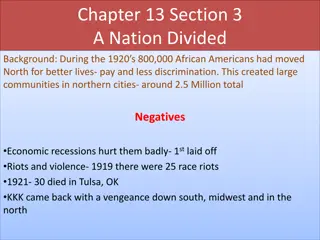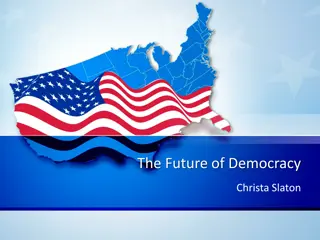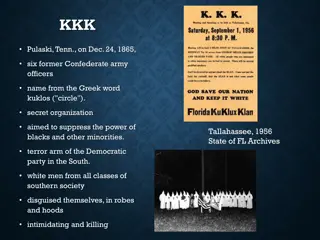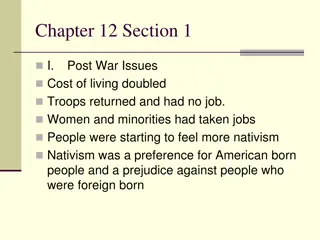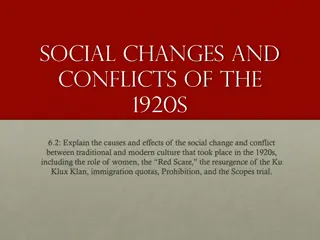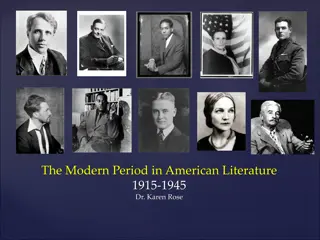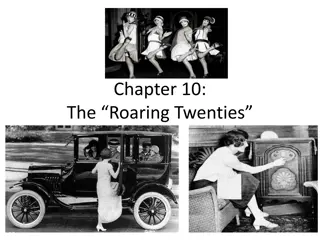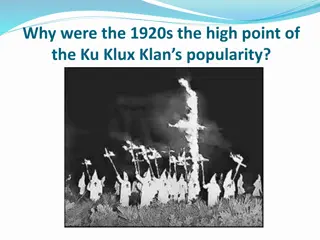Turbulence and Triumph: African American Struggles in the 1920s
In the 1920s, African Americans faced a tumultuous period of migration, economic challenges, racial violence, and the rise of the Ku Klux Klan. Despite adversities, leaders like Marcus Garvey, NAACP, and A. Philip Randolph emerged to defend their rights and promote black unity. The era also witnesse
0 views • 7 slides
The Complex History of American Democracy Through Visuals
Explore a collection of images depicting pivotal moments and challenges in American democracy, from historical events like the Civil War and Civil Rights Movement to modern-day issues such as voter suppression and conspiracy theories. Reflect on questions about the current state of democracy, polari
0 views • 26 slides
History and Impact of the Ku Klux Klan in the United States
The Ku Klux Klan (KKK) is a notorious secret organization founded in Pulaski, Tennessee, in 1865 by former Confederate army officers. Originally aimed at suppressing the power of blacks and minorities, the KKK evolved over the years with a goal to reestablish white supremacy. The Klan was responsibl
0 views • 5 slides
Post-War Issues: Nativism, Red Scare, and Labor Unrest in the 1920s
The 1920s saw a rise in nativism, with Americans feeling threatened by job competition from women and minorities. The era was marked by the Red Scare, fueled by fears of communism spreading globally, leading to the formation of the Ku Klux Klan. The Quota System was implemented to limit immigration,
0 views • 7 slides
Social Changes and Conflicts of the 1920s: Causes, Effects, and Role of Women
The 1920s saw significant social changes and conflicts between traditional and modern cultures in America. Industrialization, urbanization, and immigration fueled these shifts, leading to clashes between conservative values and a more liberal outlook. Women gained suffrage but did not see substantia
0 views • 15 slides
The Modern Period in American Literature: 1915-1945 - Cultural Shifts and Historical Events
America's cultural coming of age during the Modern Period (1915-1945) saw significant artistic innovations in response to historical and economic events. The era was marked by World War I, social tensions, the women's suffrage movement, Prohibition, the rise of the Ku Klux Klan, and the Great Depres
0 views • 21 slides
The Roaring Twenties: Politics and Social Issues in 1920s America
The 1920s in America marked a period of significant political and social change. The nation saw a return to conservatism and isolationism after World War I, with the Republican Party in control. Nativism was on the rise, leading to restrictive immigration laws and controversial events like the Sacco
0 views • 22 slides
The Rise of the KKK: Origins, Objectives, and Decline
The Ku Klux Klan (KKK) was founded in Pulaski, Tennessee, in 1865 as a social club for former Confederate soldiers. Over time, it evolved into a terrorist organization with the goal of discouraging black people from holding positions of power and enforcing segregation through fear and violence. Desp
0 views • 13 slides
Societal Divisions and Racial Tensions in 1920s America
The 1920s in America were marked by a rise in popularity of the Ku Klux Klan, with millions of members at its peak. Segregation laws like Jim Crow enforced racial divides, especially in the South, while the North saw less overt racism but still faced inequality. The era was characterized by societal
0 views • 15 slides
Insights from Chapter 15 of "To Kill a Mockingbird
In Chapter 15 of "To Kill a Mockingbird," significant events unfold as Mr. Heck Tate informs Atticus about Tom Robinson being moved to the Maycomb jail. Tensions rise as concerns about Atticus losing everything in the case surface. The presence of the Ku Klux Klan is highlighted, shedding light on t
0 views • 15 slides
